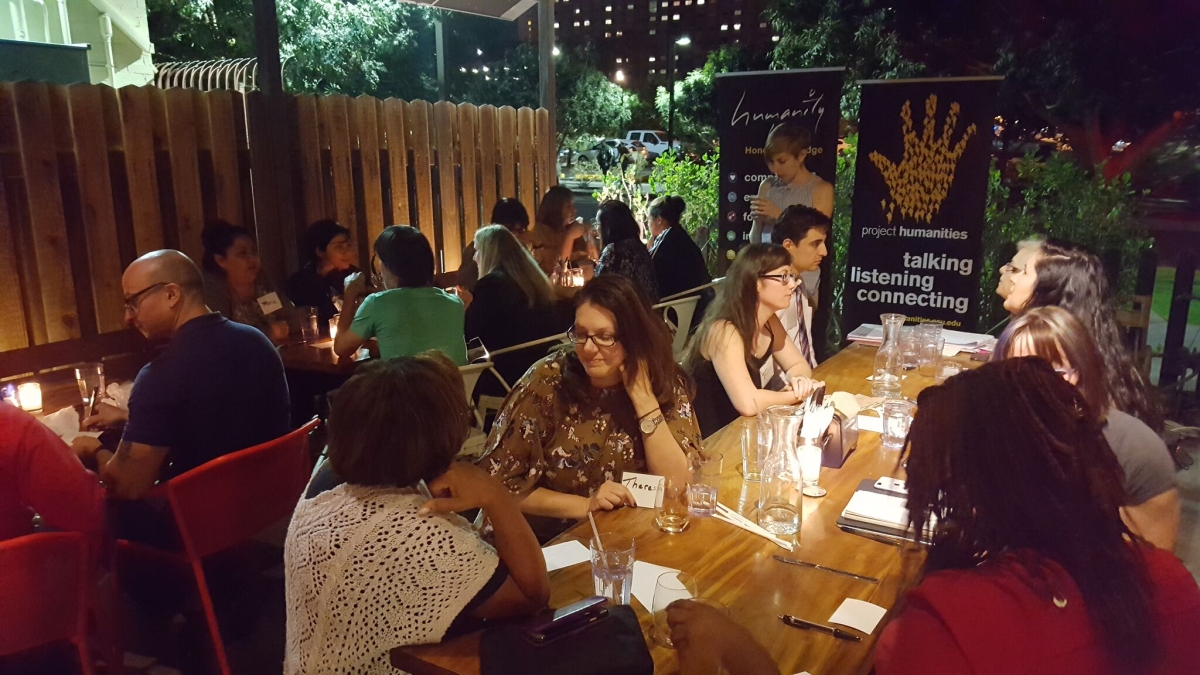ASU Project Humanities hosts second installment of 'Aridity and the Desert'

It almost sounds like the start of a joke: How do you get a staunch Republican and a left-leaning Democrat to have a civil conversation about Arizona politics? Sit ’em down for a meal.
“It’s hard to be uncivil when you’re having a meal with someone,” said Neal A. Lester, founding director of Arizona State University's Project Humanities and Foundation Professor of English. “Bringing people together around a meal has the potential to make conversation easier to have, especially surrounding politics.”
Project Humanities is hosting “Aridity and the Desert: Politics and Politicians,” part of a new community engagement series that brings together diverse individuals to discuss tough topics in an engaging and thoughtful way. The Feb. 1 event is the second installment of the series and part of the initiative’s spring 2018 programming for its ongoing campaign, “Humanity 101: Creating a Movement.” The dinner and dialogue start at 6 p.m. at Valley Bar, 130 N. Central Ave., Phoenix.
The award-winning initiative brings together individuals and communities from around Arizona to instill knowledge in humanities study, research and humanist thought. Project Humanities facilitates conversations across diverse communities to build understanding through talking, listening and connecting.
Lester said that “Aridity and the Desert” was born out of the idea that people have been taught to avoid discussions on potentially controversial topics such as religion and politics, which has led to a general lack of understanding of people with different backgrounds who hold opposite beliefs.
“A lot of folks who come to our university programming are pretty liberal and mostly politically progressive,” Lester said. “Our challenge especially for this event has been how to we get those with more conservative values and perspectives to come to our programs and not feel like they’re under attack or have to defend their positions?”
Breaking bread is a good start, said Jennifer Linde, a senior lecturer at ASU’s Hugh Downs School of Human Communication and a facilitator for Civil Dialogue, a structured format for public dialogue used to foster civil communication when discussing tough or controversial topics.
“The thing that food does as a cultural ritual is to give us space to see the other person as a human being,” said Linde, who will facilitate the Feb. 1 event. She added that Arizona is historically a conservative state and tends to give more voice to that perspective. Conversely, she said universities like ASU tend to drown out conservative voices.
Linde also believes that national and local elections and social media can be polarizing and divisive, especially when people feel they can attack anonymously.
“There’s been incivility on both ends of the political spectrum,” said Linde, referring to the 2016 presidential election. “We have to balance that out.”
In a civil dialogue session, volunteer participants consider a provocative statement and have the opportunity to take a position on the statement ranging from “agree strongly” to “disagree strongly.” Participants are asked to follow guidelines for civility that are explained by Linde.
The dialogue is then extended to the broader audience who are encouraged to respond with their own opinions and questions. Participants then continue their dialogue while dining.
Miguel Fernandez, a literature and technology professor at Chandler-Gilbert Community College who participated in a similar “Aridity” event in November, said the power of food is not to be underestimated.
“We all eat and we all have our opinions,” Fernandez said. “It was a nice buffer that a standard ice-breaker wouldn’t be. That helped the conversation about Arizona, place and identity be more honest.”
Project Humanities will host the third installment, “Aridity and the Desert: Pride and Prejudice (Intersectionality within LGBTQIA+ Communities),” on Feb. 20.
More Law, journalism and politics

ASU experts share insights on gender equality across the globe
International Women’s Day has its roots in the American labor movement. In 1908, 15,000 women in New York City marched to protest against dangerous working conditions, better pay and the right to…

ASU Law to offer its JD part time and online, addressing critical legal shortages and public service
The Sandra Day O’Connor College of Law at Arizona State University, ranked 15th among the nation’s top public law schools, announced today a new part-time and fully online option for its juris doctor…

ASU launches nonpartisan Institute of Politics to inspire future public service leaders
Former Republican presidential nominee and Arizona native Barry Goldwater once wrote, "We have forgotten that a society progresses only to the extent that it produces leaders that are capable of…

